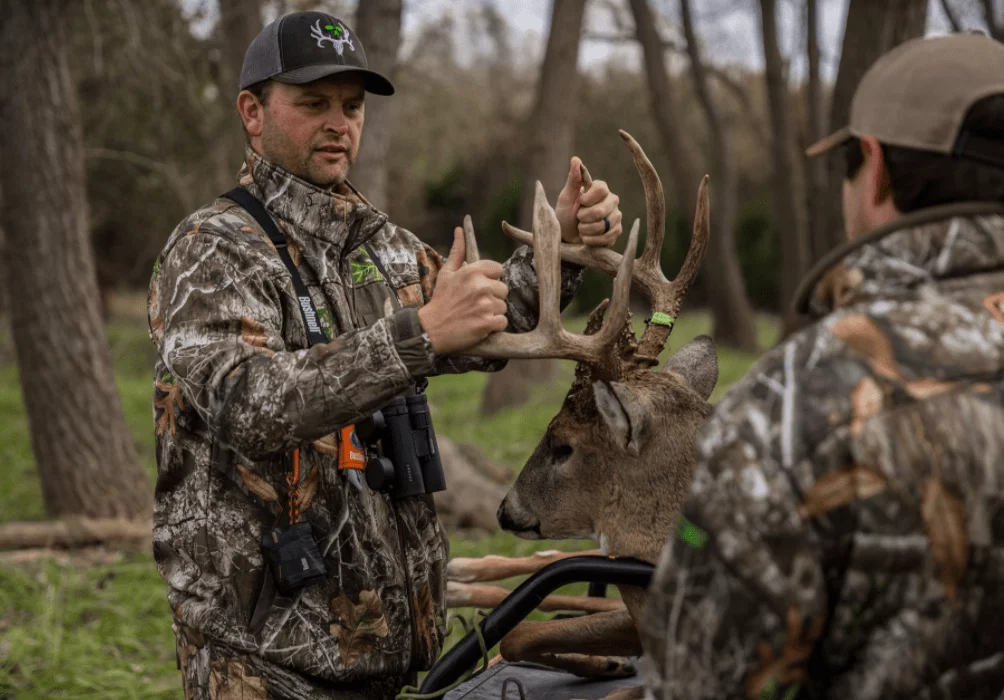How to Get Permission for Hunting Access
There’s no doubt that deer hunting your own tract of land or leasing a large amount of land with other hunters in a club is a great way to experience hunting success. But private hunting land can be expensive to buy yourself, and hunting clubs aren’t necessarily cheap either. Luckily, there are ways to gain permission for hunting access so you can hunt prime tracts of land for a fraction of the cost, or in some cases, in exchange for some sweat equity. Not only is it still possible today, but hunters do it every year and have great success. Here’s how you can try it too.
Step 1: Determine Your Hunting Location
The first step in gaining hunting access somewhere is to narrow down where you want to hunt and where you have a good chance of success. Start by looking at aerial maps where you’d like to hunt. Look for areas that would seem to offer good hunting opportunities, such as a good mix of agricultural fields next to wooded ridges or river corridors. Also look for good pinch points and access routes. Your county GIS maps or a good old-fashioned plat book can provide insight on who owns the tracts of deer hunting land and the acreage of each property. Keep in mind that you are not purchasing the property, so there is no need to be super picky. This is kind of a numbers game after all, as many landowners will say no regardless of what you do, so the more properties you initially ask about, the better your odds will be. Also, while it’s great to have hunting access to large hunting properties, many quality deer can be managed and killed on smaller, out-of-the-way properties too. Don’t make the mistake of overlooking honey holes due to a lack of acreage.
Step 2: Contacting Landowners for Hunting Access
Once a tract of land is narrowed down, approach the landowner and politely ask them about their property. They may say no because they hunt the property themselves, someone else may already be leasing the land, or they just may not allow hunting at all, but there is only one way to find out. The most desirable time to approach a landowner is on the weekend and during the middle of the day (when you are most likely not inconveniencing them). Unless you are hunting out of state or hours away, avoid calling them, as you’d be very unlikely to say yes to someone on the phone, wouldn’t you? Meeting them in person is the best route to take when negotiating hunting access. That being said, making a phone call to set up a meeting time can sometimes work.

Before meeting them face to face, keep your overall appearance and demeanor in mind. You should always be sure to present yourself as a respectable and respectful, law-abiding hunter. There are no second first impressions. Consider even going so far as to wash your truck and tuck your shirt in. Bottom line, if you’re wondering how to get hunting access, start by being as friendly and polite as you can be. And it should be said…some landowners will say no, regardless of how polite and respectful you are. They may have been burned by a previous hunter, and it left a foul taste in their mouth for the whole thing. This is why it’s important to have a few properties on your initial list.
Step 3: How to Make a Good Impression
A great way to lock down a nice tract of land to hunt is to offer to do yardwork or lend a helping hand on the property throughout the year. Keeping grass mowed, cutting firewood, cleaning their yard after storms, fixing fences, and completing miscellaneous chores whenever possible will show the landowner that not only are you serious about your hunting privilege, but you are also a respectable individual. Poachers and unethical hunters are not the type of person to work hard for success, so you won’t find them offering a helping hand to a landowner. For this reason, the best time of year to contact someone for hunting access is in the summer, which allows you time to “earn your keep” and build trust with the landowner. If you can keep your word and show you’re committed to them, they will generally be happy to let you hunt on their land. To sweeten the pot, a little bribery (in this case) doesn’t hurt – consider bringing them a gift card, some baked goods, or even some venison to show your appreciation.
Bow hunters usually have to work harder for everything in the deer hunting world. Close encounters, scent elimination, and blood trailing are not unique to bow hunting, but are much more prevalent than other types of deer hunting. Gaining permission to hunt land with archery-only equipment is one small part of the hunting world where bow hunters actually have an edge on the competition. Centerfire rifles have long ranges (and are viewed as inherently more dangerous by some landowners) and shotguns are just as noisy, which can dissuade some landowners from saying yes. But a bow is quiet, lethal, and has a much shorter shooting distance. By telling the landowner you will hunt with archery equipment only, you will increase your odds of gaining hunting permission.
Step 4: Legal Reminder
Importantly, some states have a law requiring written permission to hunt a property, but this is also beneficial even if it’s not the law. You should take every precaution to ensure you are known as an ethical hunter who follows not only state game harvest laws, but also the rules of the landowner. If they have any special rules they want you to abide by, include that in the agreement. Having a signed hunting lease agreement can help ease their mind too, since it removes their responsibility as a landowner if it comes to insurance under a hunting accident, for example.
Step 5: Hunting Season
Finally, when you actually go out to hunt on private land, do everything you can to be respectful of their property. If you have to open a gate to access your hunting area, please make sure you close the gate behind you. Letting cows out is a surefire way to get kicked off that property for good (and probably ruin anyone else’s chance too). Notify the landowner when you plan to hunt their property, just as a courtesy. And it should go without saying, but don’t ever leave any garbage/litter behind, cut any trees without permission, or leave ruts in their field or trails. After earning their trust, some landowners may even let you plant a small food plot or put up a more permanent hunting blind. It depends on how much time and effort you take to cultivate that relationship.

As we said, now is the time to start knocking on doors to gain hunting access from landowners. By following these steps, you can go ahead and begin the scouting and prepping endeavors for this fall’s hunting adventures. There are many mistakes made annually by deer hunters, don’t let missing out on an opportunity to hunt a prime tract of land stop you from filling your tag. Get out and meet some landowners!


